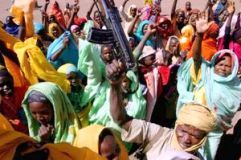Darfur talks on knife-edge as AU orders Sudan to halt offensive
ABUJA, Dec 17 (AFP) — The future of the African Union’s troubled bid to broker a peaceful end to the Darfur conflict will be decided on Saturday after the body gave the Sudanese government an ultimatum to halt its latest offensive against the long-suffering region’s rebel groups.

|
|
Villagers cheer Sudan Liberation Army (SLA) rebels at Deribat, in the mountains of South Darfur, western Sudan November 16, 2004.. (Reuters). |
An African Union commission overseeing a shaky truce in the arid western Sudanese region told delegates to the Abuja peace conference that the government must halt a two-week-old push into rebel-held areas by 6:00 pm (1700 GMT) on Saturday.
“If the government does not comply we will know that they are not really ready to continue with the talks. By 6:00 pm we will know what to do,” said Sam Ibok, a senior AU diplomat who chairs the political negotiations which are at the heart of the Abuja process.
The talks have effectively been stalled since Tuesday when Darfur’s two main rebel groups — the Sudanese Liberation Movement/Army (SLM) and the Justice and Equality Movement (JEM) — walked out, complaining that Khartoum had breached the ceasefire and had ordered an offensive in the south of the region.
On Friday, the commander of the African Union’s observer force in Darfur confirmed that the Sudanese army and the government-backed Janjaweed militia were indeed on the march and had attacked two towns and looted and burned at least eight villages in the first two weeks of December.
“One thing that must be said today is that the situation in Darfur has become more dangerous with the build-up of forces in the last two weeks … The present situation in Darfur is therefore that of a timebomb which could explode at any moment,” General Festus Okonkwo said, in a report to delegates.
“The quantity of arms and ammunition brought into Darfur to meet the present build-up of troops in the region is so astronomical that the issue is no longer whether there will be fighting or not, but when the fighting will start,” he said in the report, a copy of which was passed to AFP.
Sudan’s chief negotiator in Abuja, Agriculture Minister Majzoub al-Khalifa, told reporters that government forces had been ordered to halt their operations and had done so, except in one area near the rebel-held area of Labado where he said they had been attacked by rebels on Friday morning.
But Okonkwo said the operation was continuing as late as Thursday.
“Military activities on the ground on December 15 indicated that the force was poised for a withdrawal operation, but on December 16 it was confirmed that the brigade-sized force instead resumed its advance and is now deployed eight kilometres (five miles) west of Labado,” the general’s report said.
“From a military point of view this indicates an offensive which, if launched, would be prejudicial to the peace process,” it said.
Responding to the ceasefire monitors’ warning, the AU joint commission overseeing the peace process issued an ultimatum.
“The commission requests the government of Sudan to immediately halt its present military offensive and to withdraw its forces from the position they are holding now,” said the body’s chairman Mohammed Ali Abdallah.
Abdallah also ordered Darfur’s main rebel groups, whose leaders are also in Abuja for an AU-sponsored peace conference, to halt “attacks against commercial activities and government infrastructure, including police stations.”
The commission gave both parties until 6:00 pm on Saturday “to take concrete measures in order to comply with the decision” and asked the AU observer force in Darfur to monitor their response on the ground.
Al-Khalifa, objected to manner in which the commission’s decision was made public without consultation, but AU officials insisted it was not open to debate. Rebel spokesman said they would make their response on Saturday.
SLM negotiator Adam Chogarsh said: “We are still maintaining our position that unless the government withdraws its troops to their original position we when signed the Ndjamena agreement we will not continue with the talks.”
Darfur has been at war since the rebels launched their insurrection in February last year, seeking greater autonomy for the region, but the sides have in theory been observing a ceasefire since April when they signed a truce.
Khartoum-linked militias have been blamed for a campaign of ethnic cleansing including murder, rape and pillage. Some 70,000 people are estimated to have been killed since the conflict began and 1.65 million displaced.
